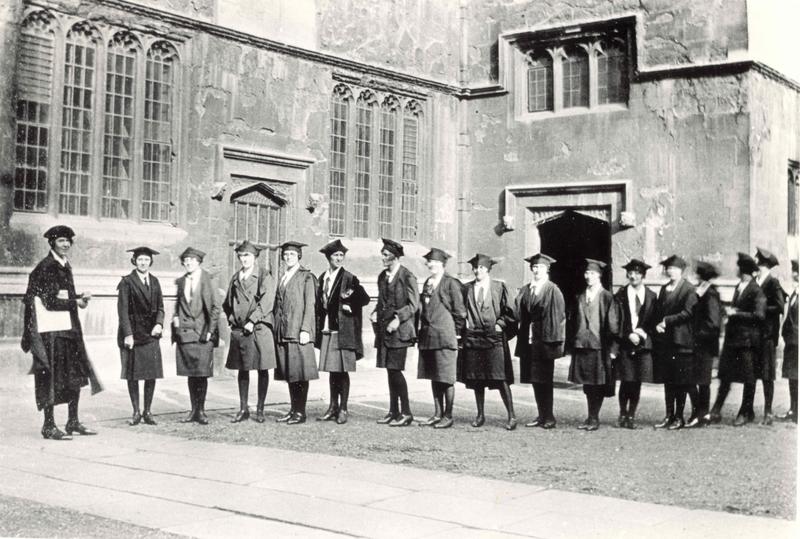1894-1896

Debating Degrees for Women
In 1894, three years after Scottish universities and sixteen years after London University conferred its first degrees on women (with the exception of medicine); Oxford began debating in earnest degrees for women.
By 1894, all the examinations leading to the BA degree at Oxford were open to women who were able to study under exactly the same requirements as men. However, they did not qualify for a degree and were instead issued with a certificate from the Delegacy of Local Examinations testifying to the completion of their studies. Clearly, this was a huge injustice as women who laboured under much worse conditions than the men (given the poverty of their Colleges and lack of facilities) had little to show for their efforts by the time they left the University.
In 1894 Fellow of Queen’s College and President of the AEW, T. H. Grose, suggested that a special degree (not a B.A) might be awarded to Oxford women who had resided in Oxford for three years and taken a course of three examinations.
While the AEW council agreed with Grose and voted to submit this proposal to the Delegacy of Local Examinations, the submitted proposal was altered so much by the Delegacy that the AEW withdraw it. By December 1894, the AEW council voted on two resolutions. The first resolution concerned asking the University to admit women to the BA degree and the second focused on forming a committee to consider the best way to approach T.H Grose’s suggested move for separate degrees for women.
The AEW council recommended that a special register be established for students who were already studying for the BA and sought the approval of the affiliated women’s societies (in 1895 they were Somerville, St Hugh’s and LMH). All societies, apart from LMH, approved the move and on 6 March 1895, the AEW council committed to petitioning the University to admit qualified women to the current BA degree.
On 4 May 1895, the AEW announced a meeting to discuss the committee’s proposed report and to vote on the recommendations connected to the degree for women. While members of the AEW turned out in full force, there were clear divisions on whether the BA degree was the right way to proceed. Bertha Johnson, for instance, opposed the idea, believing the BA was
‘a boot made to suit men rather than women’.1
She preferred the diploma resolution put forward by Professor Richard Lodge which might appease the degree and anti-degree factions. In addition to the BA, Lodge asked that a diploma be given for an alternative three-year course where women passed three examinations such as a preliminary, intermediate and final honours exam. This alternative would allow women students to bypass the compulsory Greek and Latin embedded in the BA curriculum. Large majorities voted for each proposal, and a petition containing the resolutions was sent to the Hebdomadal Council on 13 May 1895.
Other petitions were sent to the Hebdomadal Council, including one from more than fifty headmistresses supporting women’s admission to the existing BA degree, and a counter-petition delivered by Bertha Johnson which favoured a diploma rather than a degree. As the Hebdomadal Council was obliged to consider several petitions, it appointed a committee on women’s education which was to focus on the following concerns:
- Whether the exclusion of women from the BA degree has been found to injure the professional prospects of women engaged in tuition;
- Whether the admission of women to the BA degree would be likely, and if so in what way, injuriously affect the education of women? 2
After inviting educators to discuss the questions in front of the appointed committee and weighing up the evidence, the committee issued a report on 4 February 1896.
With regard to the first issue and by a vote of 7 to 4 they reported that:
‘We think it possible that the want for a degree may occasionally have proved a disadvantage to Oxford candidates, but the evidence given does not satisfy us that the cases of hardship have been a frequent occurrence’.3
As for the second issues and by a vote of 6 to 5, they reported that:
‘We believe that a stricter course of study would in almost all cases, be preferable to the existing arrangements for women students, and we think this disadvantage may be secured by granting the degree without abolishing the freedom of choice now permitted’.4
While the appointed committee had addressed the issues laid out by the Hebdomadal Council, it could not suggest a plan of action which all members would support. Instead, the committee suggested that the Hebdomadal Council present a number of resolutions on which congregation would be asked to vote.
The first resolution proposed that women who had resided in Oxford for twelve terms in a place of residence approved by the University and had passed (under the same regulations as men) all the examinations required for the BA, would be admitted to the BA degree.
The second resolution asked that women who had resided in Oxford for twelve terms and had passed (under the same regulations as men) all the examinations required for the BA, would be awarded a diploma.
Under the third resolution, women who had been resident in Oxford for no fewer than four terms and had passed any of the examinations for the BA or any of the Examinations of Women held by the Delegacy of Local Examinations would be awarded a certificate stating the exams passed.
The fourth resolution proposed that women who had passed (under the same regulations as male undergraduates) all the examinations required for the degree of BA would be awarded a certificate stating the examinations passed and certifying that they satisfied the conditions under which undergraduates were entitled to supplicate for the BA (with no residence in Oxford required).
A fifth resolution was also added to the original four Council recommendations. This proposed that women who had passed any examinations included in the ‘Oxford University Examination for Women’ under the supervision of the Delegacy of Local Examinations would receive a diploma stating the College, Hall or other Educational Body to which the student belonged and the examinations passed.5
On 3 March 1896 hundreds of resident members entitled to vote in Congregation, went to the Divinity School to listen to debates on the first resolution regarding the BA degree and to cast their votes. Lengthy speeches in support and opposition of the resolution ensued but ultimately the first resolution was defeated by a majority vote of 215 to 140.
While this was a huge blow for pro-degree campaigners who felt that the other resolutions (especially resolution five) would be half measures that ignored requests from all over the country for women’s degrees, the vote on the further four resolutions went ahead on the March 10. Unsurprisingly all motions were defeated. Some by huge majorities once again.
Congregation had spoken and had decided that women should and would retain the status of honoured guests of the University.
A further twenty-four years would pass before Oxford University awarded BA degrees to women.





